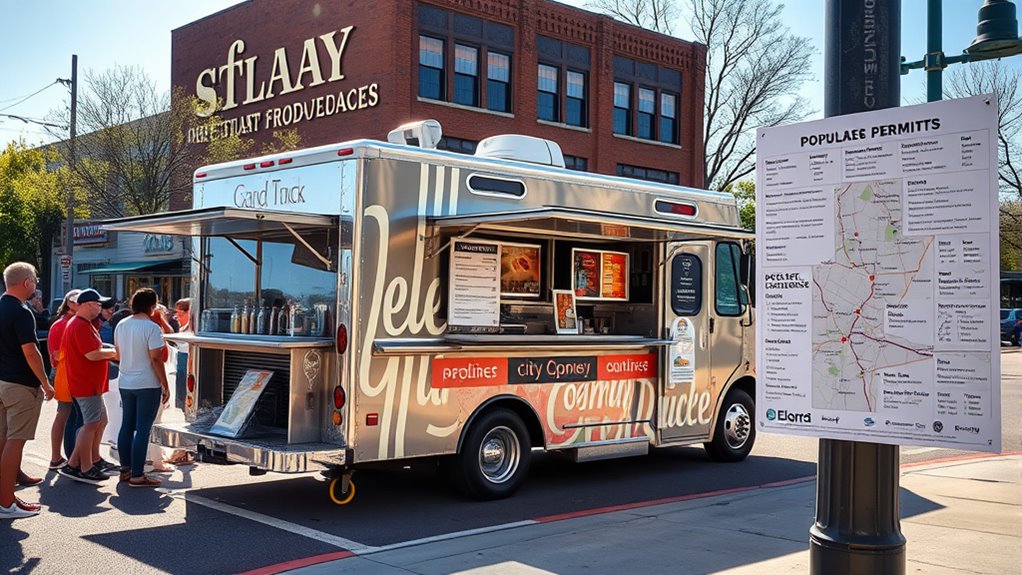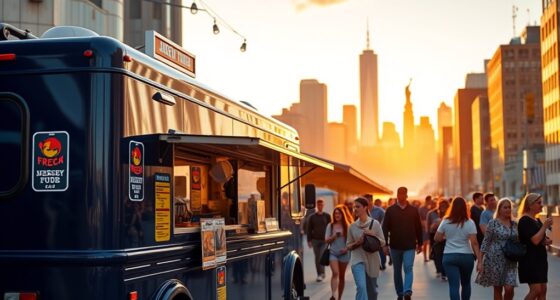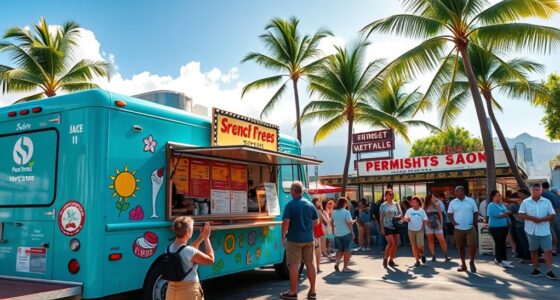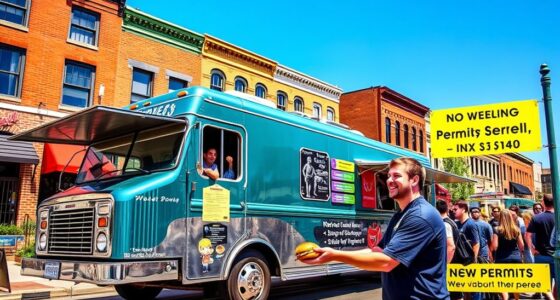To start your food truck in Lawrence, Kansas, you need to secure a $300 Mobile Food Vendor’s License, Food Establishment license, and possibly permits for private property or special events. Expect costs like insurance and site fees, and explore prime locations such as private lots or community venues. Focus on appealing menus and targeted marketing on social media. For detailed steps, tips, and local regulations, keep exploring to set your food truck up for success.
Key Takeaways
- Obtain a $300 Mobile Food Vendor’s License and necessary permits from Lawrence and Kansas Department of Agriculture.
- Focus on private property locations like retail lots, event venues, or residential zones with proper permissions.
- Develop an appealing menu reflecting local tastes, and utilize social media and community events for marketing.
- Budget for licensing, insurance, vehicle registration, and private property leasing costs in your operational plan.
- Comply with local zoning laws and special event regulations to ensure legal vending and successful business setup.
Navigating Permits and Licensing in Lawrence
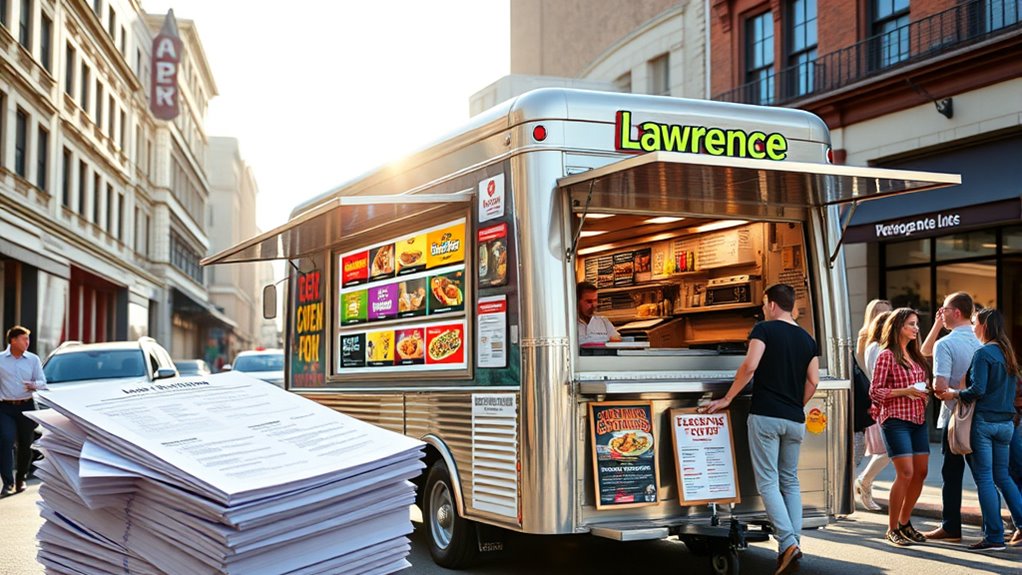
Managing permits and licensing in Lawrence is essential for operating a food truck legally and smoothly. First, you need a Mobile Food Vendor’s License, which costs $300 and is non-refundable. You also require a Food Establishment License from the Kansas Department of Agriculture if you’re preparing or serving food directly to customers. If you’re a business entity like a corporation or LLC, you must register with the Kansas Secretary of State before applying for licenses. Depending on your vending style, a Food Vending Stand License may be necessary. Additionally, if you sell certain non-alcoholic malt beverages, you’ll need a Cereal Malt Beverage License. Remember, all permits require submitting proper applications, proof of insurance, and paying associated fees, ensuring you stay compliant with local and state regulations. Obtaining all the necessary permits is crucial to avoid fines or business interruptions. Familiarizing yourself with special event regulations can also help you successfully operate during community gatherings or themed breakfasts.
Understanding Costs and Fees for Food Truck Operations
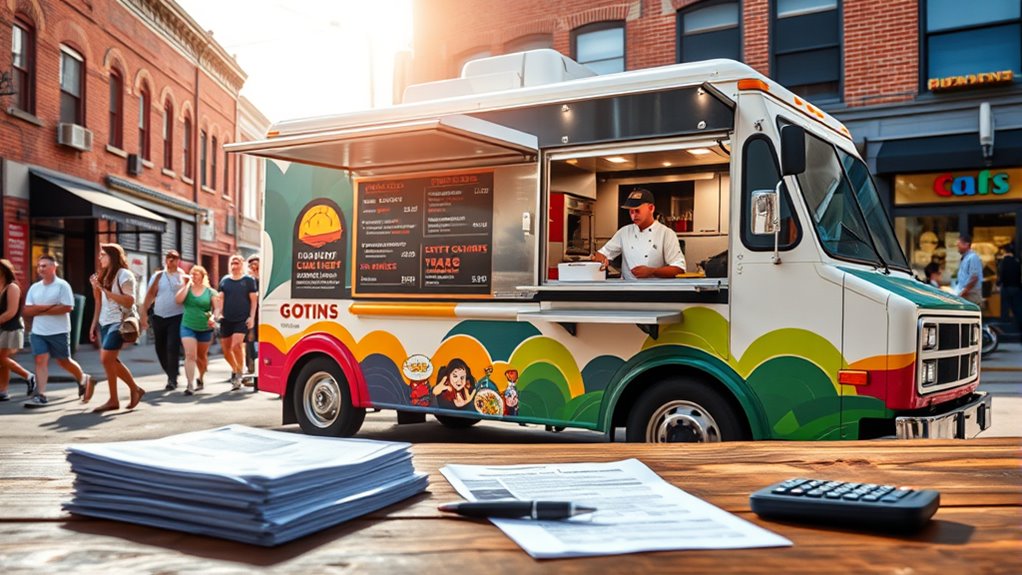
Understanding the costs associated with operating a food truck in Lawrence is essential for planning your budget. You’ll need to account for your license expenses and any additional permits that may be required for different locations or events. Being aware of these fees helps you avoid surprises and keeps your business financially on track. Additionally, it’s important to consider local ordinances that may impose specific restrictions on food truck operations, which could impact your expenses and scheduling. Understanding emotional support options for your staff and customers can also contribute to a positive business environment.
Operating License Expenses
Operating a food truck in Lawrence, Kansas involves several costs related to licensing and fees that you’ll need to budget for. The initial application fee for a Mobile Food Vendor’s License is $300, non-refundable, and includes submitting personal, business, and vehicle details. You’ll need to provide a government-issued ID, sales tax number, and truck photo. Proper licensing is essential to avoid penalties and ensure legal operation. Annual licensing costs are due each year, with fees possibly pro-rated if you start mid-year. Additional licenses, like manager or entertainer permits, cost $50 annually. Vehicle registration is minimal—$15 for trailers under 10,000 lbs—and insurance, with at least $25,000 coverage per person, is mandatory. You may also face enforcement costs for zoning compliance and permits for vending on public land.
Additional Permit Costs
To legally run a food truck in Lawrence, Kansas, you’ll need to be aware of various permit costs beyond your basic license. If you plan to operate on public land, you’ll require a Solicitor’s Permit, costing $10 per day or up to $200 for six months. This permit is unnecessary on private property. Vehicle and trailer registration costs vary: $15 for trailers under 10,000 lbs GVWR, or $50 for those over that weight. Insurance costs depend on coverage limits and vehicle type but are essential for compliance and risk management. Additionally, if you participate in festivals or events, you may need separate permits, which can add to your expenses. Operating in multiple jurisdictions or at special events will increase your permit costs, affecting your overall budget. Permits and fees are subject to change based on local regulations and the scope of your operations. It’s also important to understand regulatory compliance requirements related to health and safety standards to avoid potential fines or shutdowns.
Finding Prime Locations for Your Food Truck
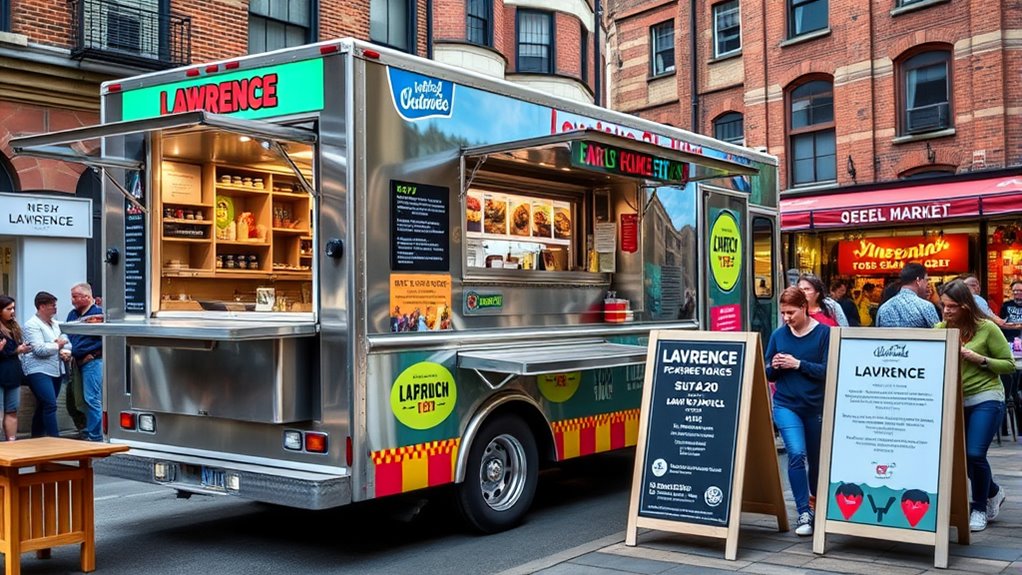
You should explore private property opportunities, like parking lots or retail centers, to secure consistent vending spots. Special event venues and festivals also offer short-term high-traffic opportunities that can boost your sales. Keep in mind, residential zones may have restrictions, so always verify local permits and zoning laws before setting up. Lawrence Food Trucks is part of a thriving mobile food culture in the area, making these locations especially advantageous for new vendors. Additionally, understanding local regulations can help prevent potential legal issues and streamline your setup process.
Private Property Opportunities
Finding prime locations for your food truck in Lawrence often means securing private property spots, as city zoning rules limit street vending to special events and designated areas. To maximize your visibility and sales, consider private properties like retail parking lots, office parks, residential lots, or food courts. These sites often don’t require city permits, simplifying your operations. Keep in mind, you’ll need permission from property owners and should assess foot traffic, accessibility, and infrastructure like utilities. Costs may include leasing space and marketing efforts, but overall, operating on private property can lower expenses compared to public locations. Focus on properties with high customer flow and good visibility to attract customers and grow your business. Additionally, understanding property owner permissions and agreements can help you navigate legal considerations and ensure smooth operations.
- Retail parking lots with high foot traffic
- Office parks or corporate campuses
- Residential properties open to vendors
- Private event venues or community centers
Special Event Venues
Securing a prime spot at special event venues in Lawrence can substantially boost your food truck’s visibility and sales. Public venues like Abe and Jake’s Landing, Lawrence Country Club, Maceli’s Banquet Hall, and New Hampshire Street spaces attract diverse crowds for private events, weddings, and community gatherings. Music and live event venues also draw large audiences for private functions and performances. To participate, you’ll need temporary use permits and coordination with event organizers to guarantee proper placement and compliance with health regulations. Many venues may have exclusive catering agreements, so early communication is vital. High-foot-traffic events like farmers markets, art fairs, university gatherings, and sports games offer great opportunities. Researching local regulations and securing necessary permits can help smooth the process. Securing a special event permit and understanding venue-specific requirements are crucial steps to ensure a successful event. Promoting your presence through social media and special menus can maximize your exposure and attract new customers.
Residential Zone Use
Locating prime spots for your food truck near residential areas in Lawrence requires understanding zoning regulations and identifying intersections where residential and commercial zones meet. You should focus on borders where residential neighborhoods border commercial districts, like along W. 9th or Indiana Street. Mixed-use areas with small commercial pockets within residential zones can be advantageous. Proximity to the University of Kansas also boosts foot traffic, especially near student housing. Keep in mind, operating in residential zones often needs special permits or variances, and approval from local planning departments is essential. Always check with neighborhood associations to ensure your location aligns with community expectations and zoning rules. Additionally, considering diverse and creative planters can enhance the visual appeal of your truck and attract more customers.
Developing a Menu That Resonates With Local Tastes
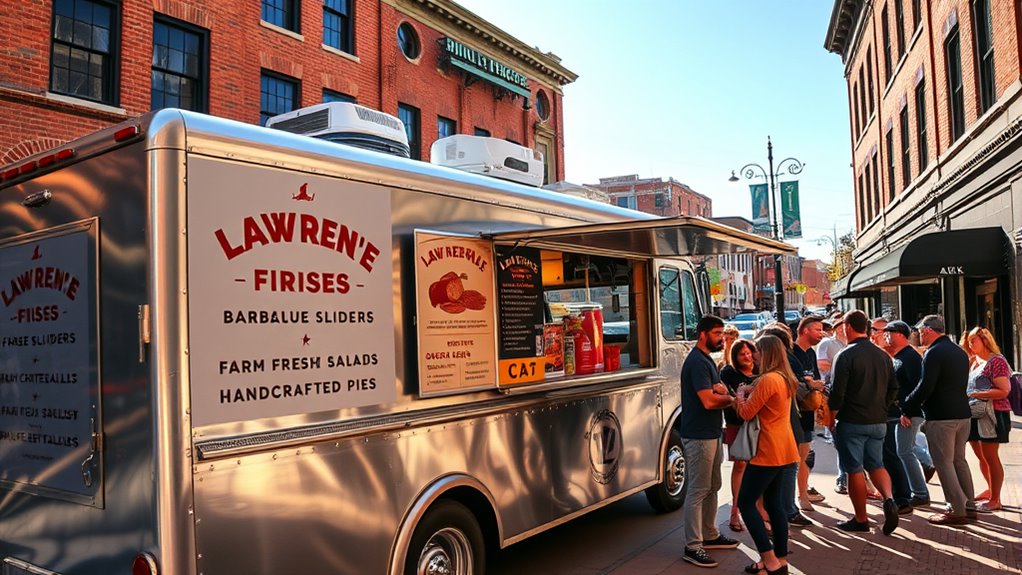
To develop a menu that truly resonates with Lawrence’s diverse community, focus on incorporating authentic flavors and familiar ingredients that reflect local tastes. Highlight cuisines like Mexican, Southern, and Brazilian, which are popular here. Adapt your offerings for office lunches and community events, emphasizing accessibility and variety. Incorporate seasonal menus during local festivities like PRIDE and Summerfest to stay relevant. Using vintage decor elements can also evoke a rustic charm that complements the diverse culinary offerings.
Effective Marketing Strategies to Grow Your Customer Base

Effective marketing is crucial for growing your food truck’s customer base in Lawrence. To maximize your reach, focus on social media, community events, email campaigns, and understanding your audience.
Social media platforms like Facebook are essential, with 75% of trucks actively marketing there, leading to a 20% sales boost for many. Engaging customers online can also increase their spending by 15%. Participating in festivals and events builds local visibility and loyalty, especially when you target demographics strategically. Maintaining an email list helps keep customers informed about promotions and specials, boosting repeat visits by up to 30%. Understanding your audience, especially Millennials and Gen Z, allows you to craft targeted messages and leverage SEO with local keywords and trending hashtags. Use technology and data analytics to refine your marketing efforts and track success. Data-driven decision-making is vital, as tracking performance metrics enables you to optimize campaigns and better connect with your community. Incorporating AI-powered marketing tools can further enhance your outreach by providing personalized content and insights.
Comparing Lawrence Regulations With Nearby Cities
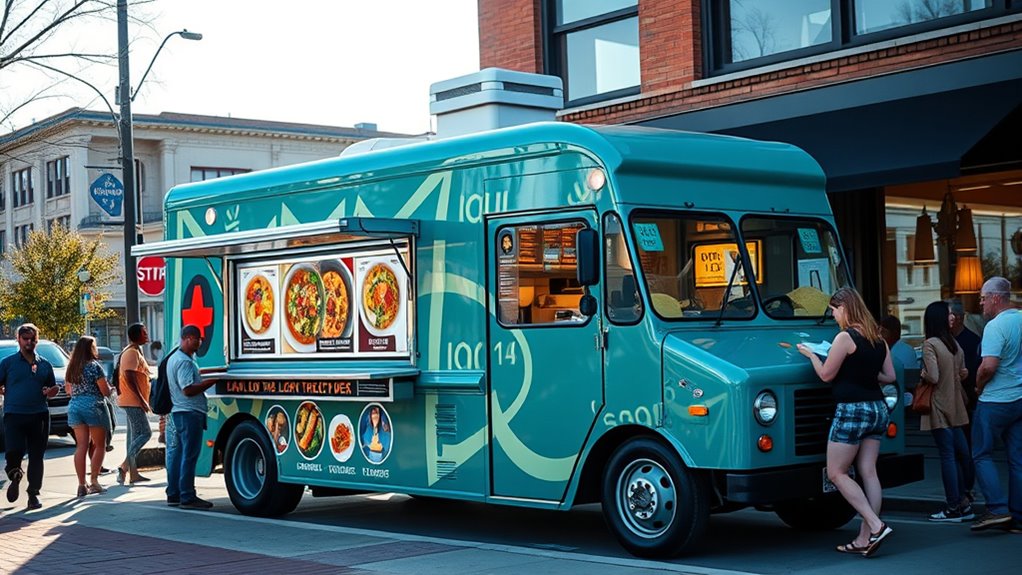
Understanding how Lawrence’s food truck regulations compare to those in nearby cities helps you navigate where and how you can operate smoothly. Lawrence requires a $300 Mobile Food Vendor’s License, which is non-transferable and valid only for the named operator. In contrast, Baldwin City only needs a $10/day or up to $200 six-month solicitor’s permit to operate on public land, with no permit required on private property. Nearby cities like Eudora have fewer restrictions, often allowing operation on private land without permits. Lawrence limits vending to private or residential zones, disallowing street vending except during events, and restricts operation to three hours per location. Baldwin and others have fewer location restrictions, making it easier to access high-traffic spots and expand your business.
Tips for Successful Food Truck Business Planning
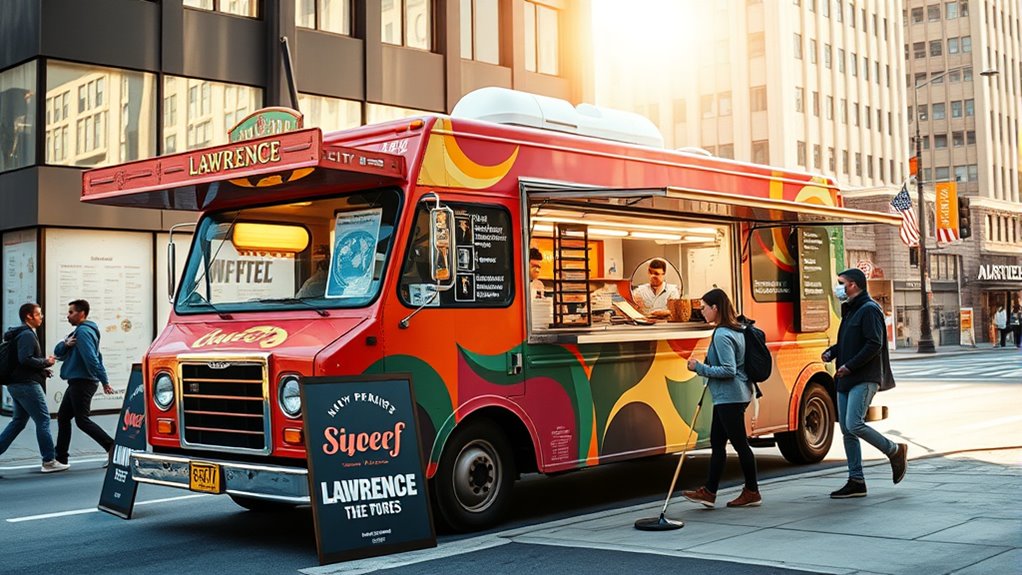
A solid food truck business plan starts with thorough research and clear goals, setting the foundation for success. You need to understand your target market, identify underserved areas, and analyze competitors. Craft a detailed operational plan covering staffing, equipment, and logistics to guarantee smooth daily operations. Develop a realistic financial plan that forecasts profits, cash flow, and expenses like permits and insurance. Additionally, create a targeted marketing strategy that leverages social media, local partnerships, and events to build brand awareness. To stay ahead, analyze food trends, adapt your menu seasonally, and explore new revenue streams like catering. Constantly monitor your costs and market conditions to adjust your plan as needed. This proactive approach increases your chances of thriving in Lawrence’s competitive food truck scene. A thorough market analysis helps you identify emerging trends and customer preferences.
Start with thorough research, clear goals, and a detailed plan to thrive in Lawrence’s competitive food truck scene.
- Research customer preferences and local demand
- Identify less saturated vending locations
- Incorporate seasonal ingredients and specials
- Use social media for real-time engagement
Frequently Asked Questions
Can I Operate a Food Truck on Residential Private Property in Lawrence?
You can operate a food truck on residential private property in Lawrence if you have the property owner’s permission. However, keep in mind that zoning laws limit operations to improved surfaces in commercial, industrial, or special purpose districts, so residential zones aren’t typically permitted. You’re also restricted to a maximum of three hours per day, and you must verify you’re not obstructing public rights of way or violating other local regulations.
Are There Specific Health or Safety Standards Unique to Lawrence’S Food Trucks?
So, you wanna know if Lawrence’s food trucks have secret health and safety standards only the city’s elite know? Well, surprise! They follow strict rules from the Kansas Department of Agriculture and local fire codes that make the TSA look like child’s play. Think handwashing sinks, temperature checks, fire safety gear, and regular inspections. Basically, Lawrence keeps your burger safe while making sure your truck doesn’t turn into a mobile fire hazard.
How Do Seasonal Weather Changes Affect Food Truck Operations in Lawrence?
Seasonal weather changes in Lawrence directly impact your food truck operations. Hot summers boost demand for cold drinks and ice cream, but you need to focus on refrigeration and hydration. Cold winters reduce customer traffic, requiring warmer menu options and heating setups. Spring and fall are unpredictable, so flexible hours and menus help. Rain and snow can cause delays, so weatherproofing and contingency plans guarantee your business keeps running smoothly year-round.
What Are the Best Times of Year to Host Food Truck Events in Lawrence?
The best times to host food truck events in Lawrence are spring and fall, especially early May and late September to early October. These periods feature mild weather, longer daylight hours, and popular festivals like the Kansas Food Truck Festival and Stocktoberfest. Scheduling during these months helps maximize attendance, boost community engagement, and take advantage of established traditions, ensuring your events are successful and well-attended.
Do I Need Additional Permits for Catering or Private Events in Lawrence?
Think of permits as your ticket to the culinary stage. In Lawrence, you’ll need a Mobile Food Vendor’s License, costing $300, for any food truck operation. For private events on private property, no extra permits are usually needed if you have property owner permission. However, for public spaces or city-wide events, you’ll need special event or solicitor’s permits. Always check zoning laws and renew licenses annually to stay in the clear.
Conclusion
Starting your food truck in Lawrence offers exciting opportunities, but maneuvering permits and costs can feel overwhelming. While the city’s regulations guarantee quality and safety, they also challenge your flexibility. Balancing local licensing with creative menu ideas and marketing strategies is key. With the right planning and persistence, you’ll turn Lawrence’s vibrant streets into your thriving culinary canvas—proof that, sometimes, following rules open the greatest flavor.
